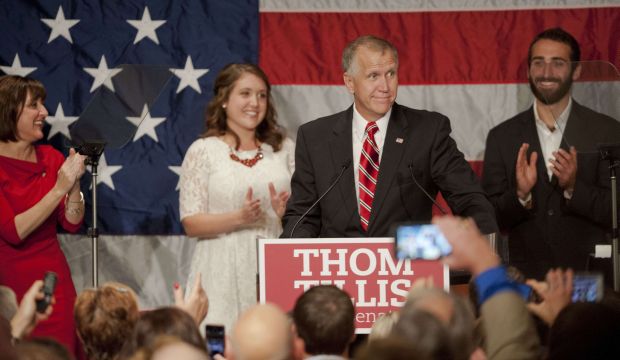
Republican Thom Tillis celebrates after winning the North Carolina Senate seat on November 5, 2014, in North Carolina, United States. (Davis Turner/Getty Images/AFP)
New York, Reuters—Republican governors triumphed in key races on Tuesday in the political heavyweight states of Florida, Michigan and Wisconsin, joining the partisan tide that gave Republicans control of the US Senate.
In races shaped by voters’ worries about the uneven economic recovery, Republicans won the governors’ posts in the Democratic strongholds of Massachusetts, Maryland and President Barack Obama’s home state of Illinois, according to projections.
The big state wins for Republican incumbents and newcomers among the 36 governors’ races bolstered an already very good night for Republicans who won back control of the Senate.
“It was a Republican sweep tonight,” said Dianne Bystrom, director of Iowa State University’s Carrie Chapman Catt Center for Women and Politics. “I think it’s tied to people feeling the country is moving in the wrong direction and on the wrong track.”
Polls showed the top issue in voters’ minds was the uncertain prospects for the economy, and Americans tend to trust the Republican Party more than the Democratic Party with fixing the economy, she said.
In Illinois, a state suffering from a public pension crisis and the nation’s lowest credit rating, Republican businessman Bruce Rauner ousted Democratic Governor Pat Quinn.
Obama, former President Bill Clinton and other big-name Democrats stumped for Quinn, but he was weakened by state budget woes.
“We have a pension problem that is threatening to devalue every asset in the state. It’s not a small issue,” said Rauner supporter Brian Timpone of River Forest, a Chicago suburb.
In Wisconsin, Republican Governor Scott Walker, a conservative Tea Party favorite considered to have presidential aspirations, defeated Democrat Mary Burke, Reuters/Ipsos projected. He survived a recall election in 2012, beating back a labor-supported effort to oust him from the governor’s office.
In Florida, one of the most important swing states in the nation, Republican Governor Rick Scott was the projected winner over Charlie Crist, a former Republican governor turned Democrat. The contest featured months of mud-slinging and attack ads on both sides.
Party control of governorships is seen as critical in the 2016 White House contest, when candidates use governors to help build state-by-state support toward a possible nomination. Going into Tuesday, Republicans occupied the governor’s mansions in 29 of the 50 states.
Incumbents fared better than predicted after polls showed about 10 governors battling to save their jobs.
“Americans are famous for wanting to throw the bums out and then they want to throw everybody else’s bums out and they keep their own bum,” said Bystrom.
Michigan’s Republican Governor Rick Snyder prevailed over a Democratic political insider, former US Representative Mark Schauer, after state finances improved under Snyder’s watch and the bankrupt city of Detroit edged closer to getting back on course.
In his acceptance speech, Snyder said his administration had not sought a quick fix for Michigan’s economic troubles.
“We realized that we could not just fix Michigan,” Snyder said. “We realized it was time to reinvent Michigan.
“Now when you talk to that young person, you’ll hear, ‘I’m moving to Detroit,'” he added.
In Pennsylvania, however, Republican Governor Tom Corbett lost to Democrat Tom Wolf, making him the first incumbent governor in his state’s modern history to fail to win a second term.
In his concession speech in Pittsburgh, Corbett said he had made tough choices as governor, knowing they would be unpopular.
“I said I might be a one-term governor, and I am. And I am proud,” Corbett said.
Among other Democratic victories were Rhode Island, where state treasurer Gina Raimondo will be the state’s first female governor. Raimondo helped the state reach a critical 2011 deal to curtail spending on pensions, which lost her some union support.
In Connecticut, Democratic incumbent Dannel Malloy claimed victory over Republican businessman and former US Ambassador to Ireland Tom Foley in a close race, though all the votes had not been counted.
“We don’t have the final numbers, but we know what the big numbers are, and we are going to win this thing,” Malloy told cheering supporters.
Kansas Republican Governor Sam Brownback won re-election by beating Democrat Paul Davis in the historically Republican state despite a bruising campaign that focused on the fiscal problems that followed Brownback’s tax cuts.
Republican Charlie Baker, the former chief executive of a New England health insurer, won the Massachusetts governor’s race, beating Democrat Martha Coakley, in the contest to replace Governor Deval Patrick, a Democrat who is retiring.
Democrats fell far short as expected in the state of Texas, where Republican Greg Abbott, the state’s attorney general, defeated his Democratic opponent, state Senator Wendy Davis, who had become a party icon for a 10-hour filibuster against abortion restrictions.
